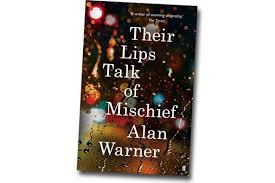Alan Warner’s latest novel, Their Lips Talk of Mischief, is set in 1984, and tells the story of a young Scottish university drop-out, Douglas Cunningham, who moves into the council house of a young couple and their baby daughter Lily after a chance encounter with the father, Llewellyn Smith, at the local hospital. Both men are aspiring writers and set out to pen the next great literary classic, as soon as the dole cheque has been spent on a pint or ten at the nearest pub. This is the dawn of Thatcher’s Britain, and these struggling (piss) artists are at odds with a changing society in their bedsit bohemianism.
As with the much of Warner’s previous work, his latest is a triumph of brilliant dialogue. He is a master of the poetry of everyday speech. In The Sopranos (published 1998) the slang and sex filled banter of his girls from The Port depicted a gang both apart from their teachers and parents, but also apart from the majority of women depicted in literature. In Their Lips Talk of Mischief, our boys Cunningham and Lou are at the age (21) when nothing is more important than impressing your friends with your wit, intelligence and supposedly unique beliefs in the pub. In their world, to proclaim anything with enough conviction is tantamount to actually doing it, which is why they spend their days drinking and discussing the literature they approve of and what their masterpiece will consist of, rather than actually writing anything. They seek to impress each other with language, which makes their conversations a joy to read. Take the following exchange when Douglas arrives at Conrad Flats:
‘What do you think? Think you could be happy up here for a bit, working as my valet in the sky?’
‘Sure. It’s great.’
‘Come on, Cunningham. You can do much better than that. Give us a few bon mots?’
I said, ‘It’s Look Back in Anger with digital watches.’
He put the fork down and clapped.
There is a steady run of social commentary from Lou and our narrator as they survey the mid-80s political scene. The boys stand with cans of Guinness watching the wreckage of the Grand Hotel in Brighton on television, prompting Lou to proclaim ‘Now we’re going to get the plucky survivor theme for a year. Napoleon was right – a nation of shopkeepers and we’ve got one running the bleeding country. Big sign up: Sorry No Credit Here, her stood behind the scales. Get out of my shop you malinger. And go eat with the miners.’
Although Douglas will stop to drop money in the miners’ tins, class solidarity is really the last thing on his mind as her settles into his new home in Conrad Flats. He is quickly sexually obsessed with Lou’s wife, Aiofe, and becomes, in his own words, the viper in the nest. A time-bomb is now ticking beneath the literary bromance, as the lads begin writing calendar captions and doing other odd jobs for publisher Toby Hanson, a yuppie figure to be pitied and rinsed for every last pint.
The real romance here is between the boys, rather than the not-quite-believable manage-a-trios between Cunningham, Lou and Aoife. At the Edinburgh International Book Festival, Warner spoke of the quaint bohemianism of the boys belonging to another era. There is definitely a feeling that this is his love letter to a by-gone youth as an undiscovered writer, a time which can never be recaptured. Cunningham’s love for Aoife seems shallow in comparison, and it has been noted in other reviews that Aoife is hardly the most intriguing object of affection. This could well be intentional on the part of Warner, as Lou comments at one point as he and Cunningham discuss Aoife and her best friend Abby; ‘Cunningham. I don’t mind you fucking Abby, or even fancying Aoife, that would be normal, but please, please do yourself the dignity and have the intellectual honesty not to romanticise them.’
Religion runs throughout the book, as Lou and Aoife’s catholic backgrounds are the main reason they are married with a child in their early twenties. This predicament makes their relationship intriguing as both Cunningham and the reader question how genuine their bond is. Lou’s resentment of his situation manifests itself in heavy drinking and bad treatment of his wife. He does eventually return to Catholicism, but this is mainly due to the fact that he is a fairly unhinged individual and when forced to give up drink chooses religion as his new vice. Warner has discussed both morality and guilt in reference to the novel, but really Cunningham and Lou are existential anti-heroes, morally ambiguous to the core in the vein of Morvern Callar.
Essentially, Their Lips Talk of Mischief isn’t a complex work of literature but a well-crafted, amusing and intriguing snap shot of a particular time in history. As usual, Warner does both sex and pop culture references well, making for a great read. It is a quiet achievement, but an achievement nonetheless, especially when added to his overall body of work. Warner is fascinating in the scope of his fiction, writing books (e.g. The Worms Can Carry Me to Heaven and The Sopranos) which could have been written by two different writers entirely. I’m intrigued to see where he will go next, and forever hopeful of a third Sopranos installment.
